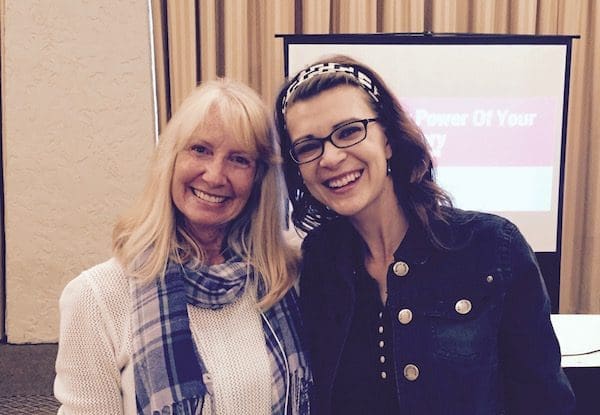I met this amazing young woman, Sarah Thebarge, at a writers’ conference in Portland this past week. Because of Sarah, I’m rewriting my memoir, and grateful for her input.
Photo credit: Unsplash
Sarah taught a coaching class entitled “The Healing Power of your Story” — eight hours in length, spread over three days, excellent in-depth instruction, writing exercises.
This from Sarah about the value of story-sharing:
Writing turns wounds into scars. Wounds are raw, painful, losing blood. Scars don’t get infected, you can touch them, they’re not painful.
So, how can telling our stories bring healing?
From the combined wisdom of my memoir-writing teacher and classmates—fellow writers who have experienced child abuse, lost families, mental health issues, abandonment—telling our stories:
1. Causes shame to lose its power
We often think if people really knew us — knew about our fears and mistakes — then they probably wouldn’t like us. Simply not true.
2. Helps us accept what happened
The events that have taken place, have taken place. We can change nothing from the past; we have power only to shape what’s ahead.
3. Frees us to be fully known
Instead of hiding behind a façade, telling our stories sets us free from the power our past had over us, free from worrying about what others might think of us, free to be us.
4. Creates community
The strength of community is hearing someone say, “I get it.”
5. Distributes the weight of our burden
We were never designed to lug this heavy thing around on our own.
6. Dispels the lies
You know, the lies that say, “This is as good as it gets,” and “You need to forget about those goals and dreams you had,” and “It’s too late for you.” Those lies.
7. Provides validation
These are our stories. They’re worth telling. They’re beautiful stories of redemption, of becoming whole again.
Sarah shared a poem with the class — “Wild Geese” by Mary Oliver. And it resonated with me. Because I once thought, “How can the world go on?”
Wild Geese
You do not have to be good.
You do not have to walk on your knees
for a hundred miles through the desert repenting.
You only have to let the soft animal of your body
love what it loves.
Tell me about despair, yours, and I will tell you mine.
Meanwhile the world goes on.
Meanwhile the sun and the clear pebbles of the rain
are moving across the landscapes,
over the prairies and the deep trees,
the mountains and the rivers.
Meanwhile the wild geese, high in the clean blue air,
are heading home again.
Whoever you are, no matter how lonely,
the world offers itself to your imagination,
calls to you like the wild geese, harsh and exciting
over and over announcing your place
in the family of things.
Meanwhile. Meanwhile, as we’re going through the most devastating things in our lives, the geese keep flying, the sun shines and the rain falls. And the world goes on.
And we think, “How can you go on as if nothing happened? The most precious person on the face of the earth has died. I am alone. How can the school buses still pick up kids; how can the autumn leaves keep drifting downward; how can people still laugh, congregated around tables in my favorite outdoor café?”
Because life goes on.
And we wouldn’t want it any other way. We are grateful that laughter will return, and hopes and dreams will revive, and we will love still; again.
* * *
Sarah’s own story – as told in her book, The Invisible Girls: A Memoir – is about surviving breast cancer and a failed relationship on the East Coast, fleeing her successful career and Ivy League education to start over in Portland, Oregon. While riding the Metro, Sarah met Hadhi, a Somali refugee abandoned by her husband, struggling to raise five young daughters in a culture she didn’t understand. On the brink of starvation and “invisible” in a neighborhood of strangers, Sarah helped Hadhi and the girls navigate American life. And in doing so, brought healing to her own brokenness.
And get this: All of the proceeds from the book are going towards a college fund for the Somali girls. How cool is that?
Sarah Thebarge, author of The Invisible Girls: A Memoir
I had a half-hour mentoring session with Sarah at this week’s conference. She asked about the goals for my book. And I knew immediately. I want to focus on the things cancer patients and caregivers can control for better quality of life. I want to show how adversity can improve relationships instead of tearing people apart. I want to offer hope; to illustrate how lessons learned will serve me as I continue forward in widowhood.
Sarah also asked about my timeline of events, whereupon she mapped them out on paper, circling, boxing, drawing lines. And suddenly everything was clear, including the fact that the widowhood portion of my story belongs in the next book.
Which means another rewrite of this book. But this is what we do. This is what makes it better. And I’ll be more pleased with the finished product than with the first draft. Gift. Priceless gift.
This from Madeline L’Engle, shared in Sarah’s class:
The discipline of creation, be it to paint, compose, write, is an effort towards wholeness.
What about you? What is your story and who should you share it with? What needs to be made whole in your life?
P.S. If you found this post motivating or know someone who should be writing or telling their story, please share, pin or tweet!



KR
The ‘art of story telling’.
May it never die, whether orally, the written word, on paper or digitally.
Marlys Johnson
It is an art, isn’t it, KR. Or is it a craft? Either way, we improve our art or craft by practicing it – by telling stories. “May it never die.” Good words.
Srwd
Excellent summary of why to write your story…thank you for sharing. I started blogging about 9 months out from my husband’s homegoing…had journaled through it, but not sharing..was a way to thank God for his goodness in a time of hurt…added family stories. Published the grief lessons this year…so fun…
Marlys Johnson
What a creative way to honor God in your loss and sorrow. I love the added family stories and that you published your work. Good for you!
Joshua Conn
Great article and summation on what to do with pain and turning it into progress through story! Stories make life understandable. To suffer is to be human, why are we afraid of this truth? What if we deconstructed the ideal in our past visions and were more real in our story telling as we pursue our future hopes and dreams?
Marlys Johnson
I think people relate better to our stories if we are more real, vulnerable, honest. You pose a great “what if” question, Joshua.
Lynn Hare
Excellent blog post, Marlys! I figure, when we tell our stories we live Revelation 12:11: “They overcame the enemy by the blood of the Lamb and the word of their testimonies.” When you and I tell our story, it’s one enormous act of retribution against the enemy. My story involves wrapping a car around a metal light pole and injuring my son in the process. It’s healing to my heart when I tell the story of how God is releasing His redemption in our lives.
Marlys Johnson
For story-telling to heal your pain is huge, Lynn. I love those words: “one enormous act of retribution against the enemy.” Well said.
Cindy Pierce
This is a poem that a friend sent me after my husband died. It helped inspire me to keep going at a time when I really needed that help. Don’t know who wrote it. Keep writing!
The tide recedes but leaves behind bright seashells in the sand.
The sun goes down but gentle warmth still lingers on the land.
The music stops and yet it echoes on in sweet refrain…
For every joy that passes something beautiful remains.
Marlys Johnson
The poem is beautiful, Cindy. “The music stops and yet it echoes on in sweet refrain.” I can so relate to its message, as I’m sure you did when your friend gave it to you. Thank you for sharing it here.